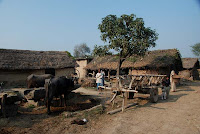 We have been spoiled by great weather for the last three months – cool temperatures, bright sunshine and blue skies with great views of the mountains – but that has all changed in the last week. A haze has settled over Pokhara and with it, the temperatures have dropped. In reality, it never gets really cold here, but buildings here are generally designed to lose heat rather than retain it, and don’t have any heating in them. As a result, when the sun doesn’t shine, sitting at a desk for eight hours a day becomes a chilling experience and lots of layers plus a good supply of coffee are essential!
We have been spoiled by great weather for the last three months – cool temperatures, bright sunshine and blue skies with great views of the mountains – but that has all changed in the last week. A haze has settled over Pokhara and with it, the temperatures have dropped. In reality, it never gets really cold here, but buildings here are generally designed to lose heat rather than retain it, and don’t have any heating in them. As a result, when the sun doesn’t shine, sitting at a desk for eight hours a day becomes a chilling experience and lots of layers plus a good supply of coffee are essential!
The latest proposed date for elections here in Nepal were announced last week, and immediately, the political tension has risen, with lots of obscure political groups planning blockades and strikes. Two of the most important references for everyday life at the moment are the load shedding schedule, that tells you when electricity will be available, and www.nepalbandh.com/ a website that lists when strikes have been planned and when you might be able travel.
Nepal’s electricity is all hydro-generated, but unfortunately, around 80% of the rainfall arrives during the summer monsoon resulting in flooding and voltage surges, while in the drier months river levels fall and there is not enough electricity to go around. Add to that, rapid development and growing demand for electricity, and an aging infrastructure that is not being invested in, and there are bound to be problems and load-shedding is applied nationwide. At the moment we are without power for around six hours a day, but at least with a schedule you can charge up batteries and get the candles ready!
 Bandhs are a part of everyday life here. For many poor people, blocking a road seems to be the only way to get the government to listen to their concerns and actually do something. For others though, bandhs are also a useful tool, and are used by political parties and other vocal minorities to cause disruption and force their opinions onto the majority. Yesterday was a good example: the price of gas and kerosene went up (in reality, the government just reduced its subsidy) and so a group of students blocked the roads with burning tires near our office, trying to protect their ‘right’ to cheap fuel. The police feel powerless to do anything – if they tried to restrict the protesters’ ‘right’ to protest, the situation would probably just get much worse. As in the UK (and elsewhere), people are much more focused on their ‘rights’ than their ‘responsibilities’.
Bandhs are a part of everyday life here. For many poor people, blocking a road seems to be the only way to get the government to listen to their concerns and actually do something. For others though, bandhs are also a useful tool, and are used by political parties and other vocal minorities to cause disruption and force their opinions onto the majority. Yesterday was a good example: the price of gas and kerosene went up (in reality, the government just reduced its subsidy) and so a group of students blocked the roads with burning tires near our office, trying to protect their ‘right’ to cheap fuel. The police feel powerless to do anything – if they tried to restrict the protesters’ ‘right’ to protest, the situation would probably just get much worse. As in the UK (and elsewhere), people are much more focused on their ‘rights’ than their ‘responsibilities’.
 Bandhs do force the government into some incredible muddles. A group of petrol retailers held a strike to protest that they were not always getting the amount of fuel they were paying for from the importers – the Nepal Oil Corporation (because the tanker drivers were stealing some of the fuel). As a result they are now allowed to dilute their fuel with up to 20% kerosene (which is cheaper) to recover their profits: genius!
Bandhs do force the government into some incredible muddles. A group of petrol retailers held a strike to protest that they were not always getting the amount of fuel they were paying for from the importers – the Nepal Oil Corporation (because the tanker drivers were stealing some of the fuel). As a result they are now allowed to dilute their fuel with up to 20% kerosene (which is cheaper) to recover their profits: genius!






















